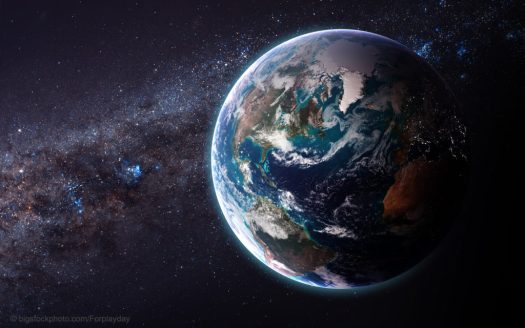
We have often mentioned before the evidence that our planet was designed to support life. More than that, it was designed to support advanced life. It was even designed for advanced civilization support.
You can see evidence for advanced civilization support in the minerals of Earth’s crust—minerals that are essential for machinery and electronics that enable technology. One thing which perhaps you have not considered is how the size of our planet also supports advanced civilization. Among the achievements of science is space flight. The ability to use rockets to leave Earth’s surface makes it possible for us to place satellites in orbit. Those satellites include:
*Communication satellites which make possible nationwide and international television, news, sports, telephone, and video conversations.
*Global positioning satellites giving us GPS which we use for many purposes including airplane, ship, and personal navigation plus farming and safety uses.
*Weather satellites giving us advance warning of storms and helping to keep us safe.
*Observational satellites that allow us to study and learn more about our planet.
*Telescopic satellites which enable us to study our solar system and the universe.
We often fail to realize how important those satellites are for our advanced civilization. Also, the ability to use rockets to leave Earth’s surface allows us to send out space probes to explore our solar system and universe.
What does the design of our planet have to do with our ability to leave the surface? The answer relates to gravity. Astronomers have been looking for habitable planets orbiting other stars. They believe that they have found many of those exoplanets. However, the planets that are more likely to be located in habitable zones (where liquid water can exist) are much larger than Earth. A much-larger rocky planet would have much more mass and therefore much more gravity. Launching a rocket into space from such a planet would be much more difficult, if not impossible. Even airplane flight and the flight of birds could be affected by increased gravity.
A planet with a diameter 70 percent greater than Earth’s diameter would have ten times the mass. The advantage of having much more gravity would be that a planet like that could hold a thicker atmosphere which could give more protection from harmful cosmic rays and incoming asteroids. The disadvantage of a thicker atmosphere would be that it might also block useful solar rays. However, getting a rocket off the ground and into space could be prohibitive. It would require a much larger rocket which would require more fuel. That would require an even larger rocket to carry the extra fuel. The weight of the larger rocket and fuel would require an even larger rocket requiring even more fuel. This quickly spirals out of control.
So what is the conclusion? We live on a planet that is large enough to hold an atmosphere that protects us but small enough that we can to break the bond of gravity to go into space. A smaller planet would not have the atmosphere we need. A larger planet would not allow us to explore beyond our planet or even to send up satellites that help to make advanced civilization possible. As Goldilocks might say, “God made it just right.”
–Roland Earnst © 2018
